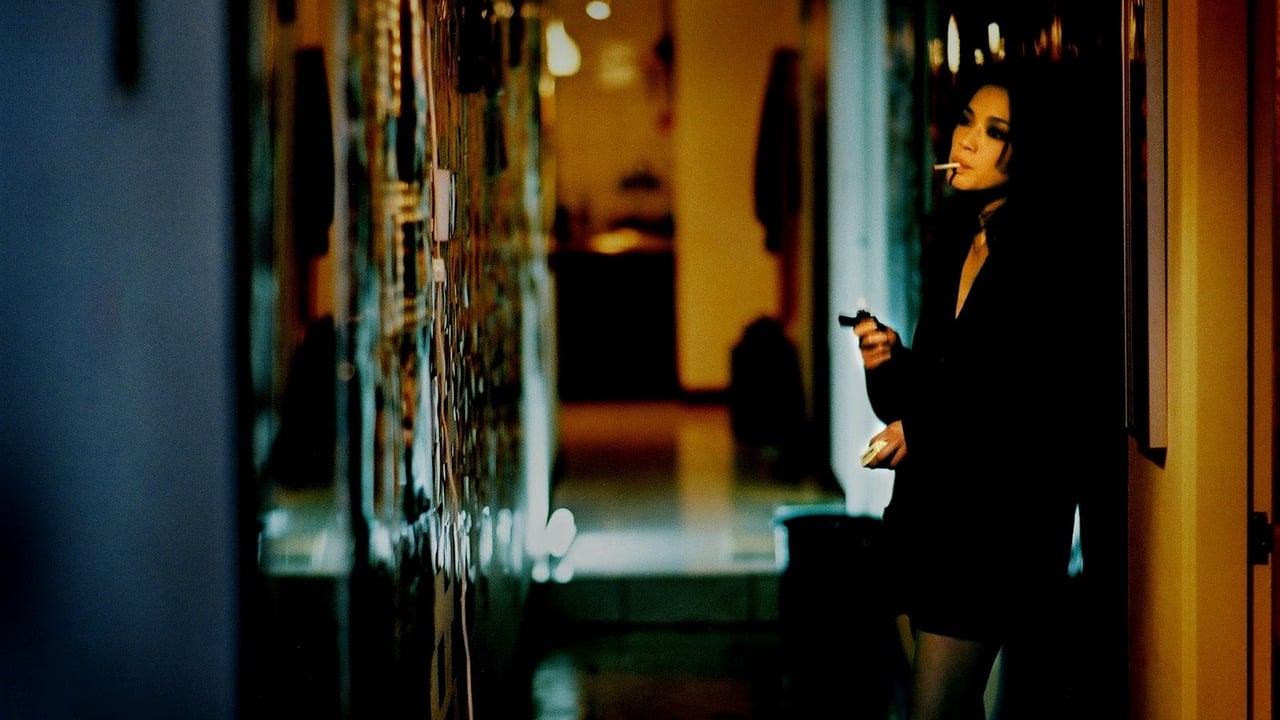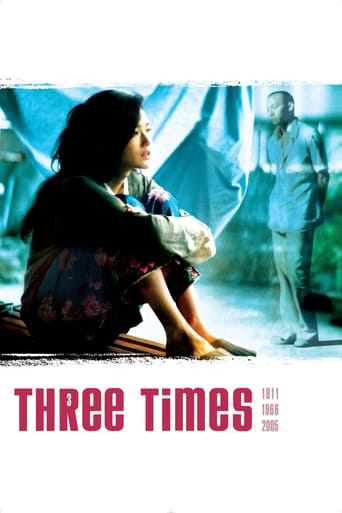

The cinema of helmer Hou Hsiao-Hsien is sometimes criticized for thin or truncated plots and lack of character development. Perhaps these criticisms are barking up the wrong tree, as I suspect it works on another plane: his movies are neither narrative- nor character- driven, but atmosphere-driven, for want of a better term. "Three Times" is certainly better appreciated if viewed in this light.Hou tells three love stories set at different times (hence the English title) over a period of about 100 years (hence the Japanese title, which translates "Hundred-Year Linked Verse"). In each tale, the star-crossed lovers are diligently played by Chang Chen and Shu Qi. The setting is Taiwan for all. The first is set mainly in billiard halls in 1966, which, however, looks and feels more like what would be 1959 if the location were the States. This impression is reinforced by the apt choice of music; the dominant track is the Platters immortal rendition of "Smoke Gets in Your Eyes," which was released in 1958. We also hear "Rain and Tears," which constitutes a temporal anomaly because it was released in 1968, after the purported time of the story. This is also before the sexual revolution, and the lovers, for all their posturing, are perfectly hesitant, awkward, and unsure. The thirst for love culminates in a tentative reach for the other's hand, merely to hold, at a bus stop.The second tale is set in an up-scale house of pleasure in 1911, and toward the end comes the news of the outbreak of the Xinhai revolution that eventually overthrew the Qing dynasty. It is told silently, any dialogue being presented in inter-titles. It pairs a refined courtesan with a revolutionary-minded man of letters, whose limits end up breaking her heart as well as dashing her dream of freedom, as the piece is actually titled in Chinese (the "dreams" are rendered "times" in English). Despite the absence of spoken dialogue, music is present in the form of old Chinese songs lip-synched by Shu while accompanying herself on a stringed instrument (possibly a "yueqin") and exquisite improvisation by Taiwanese pianist Constance Lee.Coming on the heels of the second, the third tale seems like a slap in the face as we find ourselves abruptly speeding down an expressway in the bustling and gray Taipei of the present. Life is fast, too. Shu is Jing, a jagged-edged new-age bisexual chanteuse who projects an icy persona on stage but is fragile, unstable, and subject to epileptic seizures in reality. Chang plays a biker suitor with whom she eventually finds respite, at least for a while, one hopes. In this "time," the two appropriately waste no time getting into the sack, no questions asked, and the music is appropriately techno and hard.While most reviewers prefer the first Dream of Love, the second dream is clearly the best in my mind. Despite its sluggish pace and what might be taken as temps mort, there is not a single superfluous moment in it. It grinds ever so slowly but inexorably to an emotionally crushing conclusion. The frames are literally pretty as pictures - the comparison by one reviewer here to Vermeer is no exaggeration, especially for one vignette in which the courtesan helps her Mr. Chang dress before a mirror. This is also the extent of physical contact we see between the two, but such restraint only seems to underscore the depth of her love for him.Running through all three dreams is the leitmotif of text, written with a ballpoint pen in the first, brush and ink in the second, and mobile phone in the third. In the first, Chang's character whiles away his hours at the billiard hall with the hostess right beside him, but when he wants to bare his heart, he writes her a letter. In the last, the web and teletext are where the principals go to get key information and deliver messages of real substance. And in the second, the most poignant scene comes when the courtesan, after reading a letter from the delinquent Mr. Chang, is moved to actually stroke the characters on the paper with her fingers, as if they were the hand that had written them and could give solace for her unrequited love.A 10 for the middle piece, which could be likened to a single, perfectly executed episode from Hou's "Flowers of Shanghai," and 6 or 7 for the two bookending it.
... View More"Three Times" is not just your average movie, and it definitely is not the type of movie that will broadly appeal to just anyone in the audience.The movie is roughly two hours long and is divided into three segments, each telling a different love story in a different place, time and environment. But they are set around the same two leads - Shu Qi and Chen Chang.The first segment is titled "A time for love" and it is set in 1966 taking place in a pool hall where a military enlisted man falls in love with a woman working there. This is my personal favorite of the three segments.The second segment is titled "A time for freedom" and it is set in 1911. This segment is the strangest and perhaps the most artful of the three, as it is shot mostly without audible dialog. There is a piano playing constantly, and whatever dialogue is there is shown as written text on the screen, like in the old silent movies. The story in this is about a courtesan who falls in love with a political activist. This was the toughest to get through, as it was amazingly slow paced and nothing much happened.The third and final segment is titled "A time for youth" and it is set in 2005. The story in this segment is about a bisexual singer who is in a relationship with two people, a man and a woman, but things are not all well. This last segment was fairly blend, in my opinion.I enjoy Asian movies a lot and had to check out this movie as Shu Qi was in it, and also was intrigued as the movie had received fairly well reviews and ratings. Having seen it now, I will say that the movie is entertaining, but it is hardly the type of movie that you will put into the DVD player a second time, as it just doesn't have that much entertainment value to support more than a single watching.The people in the movie did good jobs with their given roles, and that goes for all three segments, and the director, Hou Hsiao-Hsien, does actually have quite a knack for capturing raw emotions and good imagery on film.
... View MoreThe three times mentioned in this film's title are "A Time for Love," "A Time for Freedom" and "A Time for Youth," each a separate segment set in a different time period (1966, 1911 and 2005) in Taiwan, but featuring the same two actors. In "A Time for Love," the best and sweetest segment, a soldier and a pool hall hostess strike up a timid and shy romance; in "A Time for Freedom," a brothel madame yearns for a political activist for whom she's not allowed to articulate her feelings; and in "A Time for Youth" angst-filled 20 somethings navigate the tricky waters of both same-sex and opposite-sex relationships.All of the segments focus more on the female characters than they do the males, especially the second and third. The director uses clever devices to tie the three segments together, like the use of letters as the primary method of communication in the first and second segments, which morphs into cell phones and e-mails in the third. The whole movie has a languorous feel, as if the director is in no hurry to tell his story. However, this makes the movie feel unnecessarily long, especially given the slight plots that the three segments anchor themselves around. Indeed, the first segment is so touching and poignant, that the final two left me somewhat cold.An interesting Taiwanese film that's worth a look, but not an unequivocal success.Grade: B
... View MoreThis was my first Hou Hsiao-hsien picture, and I feel like I've been missing out on quite a lot, seeing as he's been doing this for about a quarter century. Not that I'm experiencing the kind of panic and regret that I might if I'd only just discovered Godard or Jarmusch. Three Times is simply the kind of movie I gravitate to, and I'm hoping it points the way to a trove of similar pleasures, even if it isn't quite a masterpiece on its own.As I'm sure others around here have written, Three Times is literally about three different times, as in eras: 1911, 1966, and 2005, and each of the forty-minute featurettes in this triptych is defined by a separate thematic quality: the 1960s, naturally, by love; the end of Dynastic rule by freedom; and contemporary China by youth. All of them, however, involve love on some level, or, at the very least, sex. Each chapter centers on a man and a woman (played by Chang Chen and Shu Qi in each case) caught up in some variation of romantic or erotic involvement that reflects the three themes.What I love about Hou's approach is that each of these forty-minute pieces tells no more "story" than an average Hollywood film would chew up and spit out in its first four or five minutes. In "A Time for Love" (the 1960s chapter) little more "happens" than a young soldier returning from military leave to find that the girl he's been writing to has moved to another town, so he tracks her down and they spend a few hours together. The other stories cover similarly scant territory while Hou allows his camera and the nearly constant presence of popular music to evoke the tempo and space of his characters' lives. Hou and his writer Chu T'ien-wen find worlds of behavior to explore and time worth spending in scenes that most writers would consider the merely necessary business of establishing a premise and getting their characters into position.If the movie doesn't exactly reach ecstatic heights, it isn't for lack of Hou's ability to fulfill his own purpose, but merely because his purpose contains almost no emotional arc, either for his characters or for his audience, and it isn't loaded up with the kind of ornate, spiritual metaphor that similarly deliberate films by, say, Bergman and Tarkovsky are. Hou doesn't seem interested (at least here) in either God or people, per se, but rather our cognitive relationship to the passage of time and the subtle but profound effect of small decisions on the course of our own histories.
... View More